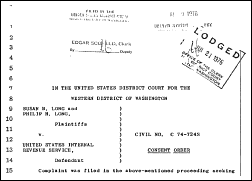Antiwar Protester's Civil Disobedience Equated with Terrorism
"You have obvious contempt for the laws of the U.S., and it bothers me," the judge, Thomas McAvoy of United States District Court, told the protester, Daniel J. Burns.
Oh how I wish there were more judges like McAvoy who'd get tough with people who show contempt for federal law! Like a certain occupant of 1600 Pennsylvania Avenue. Sadly, this case doesn't seem to be about breaking the law, it's about vilifying the opposition.
The first time Daniel Burns was tried, in state court, the trial ended in a hung jury. That didn't stop US Attorney Miro Lovric, who prosecuted him for trespassing, damaging government property and conspiracy. As it turns out, he was cleared of conspiracy charges but still sentenced to 6 months. OK, I believe that for this kind of protest, you should anticipate the possibility of having to do some time. I'm not arguing that. But some of the statements by the judge and prosecutor strike me as bordering on the absurd. Like this, from Lovric:
Mr. Lovric, an assistant United States attorney, argued that the defendants were on a "slippery slope" to committing violent acts like the Oklahoma City bombing.
Excuse me? A group of Catholics protesting an illegal war by engaging in an act of civil disobedience wherein they poured their own blood on the floor is equivalent to an act of terrorism that resulted in the death of hundreds? That's like saying agreeing with Michael Moore will set you on a slippery slope toward enlisting with Al Qaeda.
And then there's this one, also from Lovic:
...the prosecutor said that Mr. Burns was among a group of people who recently traveled illegally to Cuba to protest outside the United States military base at Guantanamo Bay. "His attitude is very arrogant," Mr. Lovric said. "He knows best and what's good for the country."
If I'm not mistaken, this case had nothing to do with travel to Gitmo. And if arrogance and acting illegally because you know what's good for the country are criminal offenses... well, let's just say I wonder if the DC US Attorney's taking notes.
Finally, there's this by McAvoy:
In sentencing him, Judge McAvoy said that he did not believe Mr. Burns was a "bad person," but that he could not understand how someone who thought the country had broken laws could break laws in protest.
Really. I mean, who ever heard of anything like "civil disobedience?" I'm sure they never covered that in law school or anything.
I believe the sentence and these comments by the judge and prosecutor are examples of attempts to vilify a principled opposition, and keep the public ignorant of the democratic history of civil disobedience by equating any criticism of our government with terrorism.


